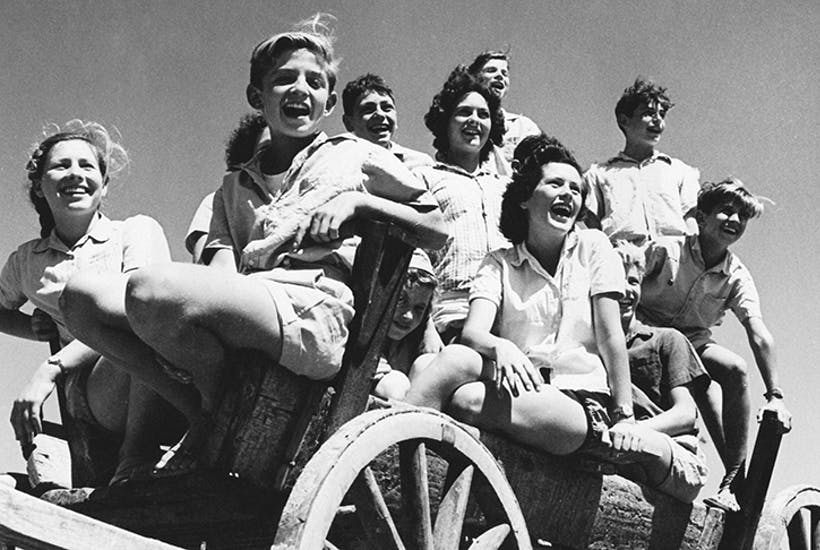Jeremy Corbyn and John McDonnell are part of a breed of socialists who argue that this time will be different. Socialism never failed, they insist: only the walls, barbed wire and jackboots did. So what they plan for Britain, while radical, is bound to work! True, it’s more radical than anything done in any European country today. Comparisons with Venezuela or Cuba or Soviet Russia are unfair, they say.
But there is one model that today’s socialists talk fondly about: the Israeli kibbutz. Early versions of these communes were created by Zionist pioneers in the early 20th century, and they became popular after the foundation of the state of Israel. By 1950, 65,000 people lived in ‘kibbutzim’ — more than 5 per cent of the population. And they remained popular until the 1980s.
One of the ideologues behind Corbynism, Jon Lansman, founder of Momentum, lived on a kibbutz in his youth. He admired for long afterwards ‘the sense of community and the radicalism of it’, and has called his time in a kibbutz ‘a very politicising experience’. You can see the allure: living in a collective of about 450 people, working the land as one big family, from each according to his ability to each according to his needs. The aims of the kibbutz — the forging of a collectivist mindset and the rearing of generations prepared to work for socialism and Zionism — are well-known. But what’s less known is the fate of the project: it turned out to be a complete, unalloyed disaster.

Joshua Muravchik, who has documented the rise and fall of the kibbutz, explains that the first sign of trouble in paradise was the revolt against collective child-rearing. To break the tyranny of the bourgeois family unit, children were raised in separate houses, where they lived and slept. Some enjoyed it, but others have described the terror of being ripped from their parents, left to the mercy of gangs of other children. Family ties were seen as the nemesis of perfect collectivism. Indeed, Jon Lansman had only one complaint about his kibbutz: ‘I was disappointed,’ he mused, ‘by the absence of children’s houses’ — he had hoped his kibbutz would include a separate building for children to be honed into impeccable young socialists.
There was another powerful force that kibbutz utopians had not taken into consideration: women’s preference for choosing their own outfits. In a traditional kibbutz, clothes were deemed to be collective property. Dirty clothes were handed to a central laundry, and clean ones were handed out in exchange — but no tabs were kept on whose were whose. Women hated it and demanded cash allowances to buy their own clothes. As the pioneers warned, this opened up a Pandora’s Box of savage individualism. If you could own clothes, why not toiletries or furniture or even individual refrigerators?
This policy, called ‘privatisation’ at the time, confirmed what now seems blindingly obvious: that people make better use of money when it is their own. When everything was shared, people left the lights on day and night, and invited new acquaintances — and even their dogs and cats — to eat in the communal dining hall for free. When the kibbutzim started giving people cash and charging them for services, people stopped wasting resources.
What happens when you can’t fire a slacker or reward someone productive?
There were other problems too. What happens when you can’t fire a slacker or reward someone productive? A scholar of kibbutz education, Yuval Dror, realised: ‘People like me who started as socialists concluded that you can work hard and get nothing while others don’t work hard. It is so unfair.’ Another kibbutz veteran concluded that his community was turning into a ‘paradise for parasites’.
The most talented and the hardest-working began to leave. This exodus was a devastating blow to the movement. The kibbutzniks thought that the first generation would be the most wayward, having been raised in a world tainted by selfishness and markets, but they believed that things would get easier as successive generations were raised within the system. As the pioneer Yosef Bussel wrote, there was a prevailing hope that ‘what we cannot achieve today will be achieved by comrades who have grown up in the new environment of the kvutza [group]’.
But instead, these young comrades found they wanted more from life and decided they didn’t want to be exploited in the name of solidarity. As a result, in the 1970s, the majority of kibbutz-raised kids started leaving. Some kibbutzim survived by borrowing heavily, which resulted in a debt crisis in the 1980s and a series of government bailouts.
In Daniel Gavron’s history of the kibbutz, we meet Bussel’s grandson, Chen Vardi. He came to believe that ‘public pressure doesn’t work any more’, and that ‘incentives and penalties’ were necessary. Asked what he would tell his grandfather if he were alive, Vardi said: ‘“You were a revolutionary,” I would point out. “You changed things. Now I want to change them in my way.”’
In the 1990s, kibbutzim began employing outside managers and assigning wages according to skill levels. In a telling answer to the essay question ‘Under socialism, who will take out the garbage?’, they started hiring unskilled labour. Eventually, most kibbutzim privatised themselves, by giving each member entitlement to their dwellings and an individual share in their factory or land. Only a few still adhere to traditional communal ideals, usually the religious ones.
So even libertarian socialism failed. Big government socialists in other places had an obvious solution: force the slackers to work, stop the talented from migrating, silence vain women, imprison dissenters. So in the kibbutz, as in everywhere with socialism, the problem was not that brutal means corrupted beautiful ends. It was that those ends were not compatible with human nature in the first place. In the end, socialism can only ever be imposed on societies by force. With proudly socialist parties seeking power, in Britain and elsewhere, it’s a point worth remembering.
Spectator.co.uk/edition
Johan Norberg on why the kibbutz failed.







Comments